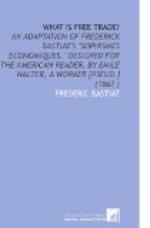And then the conclusion is drawn, that the best custom-house regulation would be that which should give the utmost possible facility to the entry of raw material, and oppose the greatest obstacles to articles which have received their first manipulation by labor.
No sophism of political economy is more widely spread than the foregoing. It supports not only the protectionists, but, much more, and above all, the pretended liberalists. This is to be regretted; for the worst which can happen to a good cause is not to be severely attacked, but to be badly defended.
Commercial freedom will probably have the fate of all freedom; it will not be introduced into our laws until after it has taken possession of our minds. But if it be true that a reform must be generally understood, in order that it may be solidly established, it follows that nothing can retard it so much as that which misleads public opinion; and what is more likely to mislead it than those writings which seem to favor freedom by upholding the doctrines of monopoly?
Several years ago, three large cities of France—Lyons, Bordeaux, and Havre—were greatly agitated against the restrictive policy. The nation, and indeed all Europe, was moved at seeing a banner raised, which they supposed to be that of free trade. Alas! it was still the banner of monopoly; of a monopoly a little more niggardly, and a great deal more absurd, than that which they appeared to wish to overturn. Owing to the sophism which we are about to unveil, the petitioners merely reproduced the doctrine of protection to national labor, adding to it, however, another folly.
What is, in effect, the prohibitive system? Let us listen to the protectionist: “Labor constitutes the wealth of a people, because it alone creates those material things which our necessities demand, and because general comfort depends upon these.”
This is the principle.
“But this abundance must be the product of national labor. Should it be the product of foreign labor, national labor would stop at once.”
This is the mistake. (See the close of the last chapter.)
“What shall be done, then, in an agricultural and manufacturing country?”
This is the question.
“Restrict its market to the products of its own soil, and its own industry.”
This is the end proposed.
“And for this end, restrain by prohibitive duties the entrance of the products of the industry of other nations.”
These are the means.
Let us reconcile with this system that of the petition from Bordeaux.
It divided merchandise into three classes:
“The first includes articles of food, and raw material free from all human labor. A wise economy would require that this class should not be taxed.”
Here there is no labor; consequently no protection.
“The second is composed of articles which have undergone some preparation. This preparation warrants us in charging it with some tax.”




